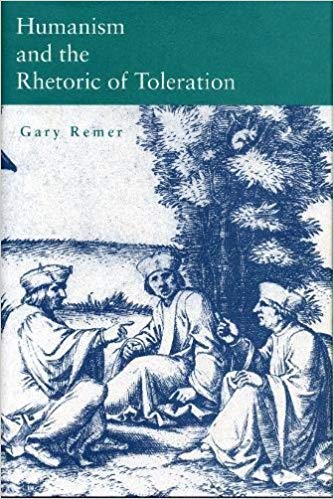Background
Gary Remer was born on November 22, 1957 in Los Angeles, California, United States. He is the son of Natan remer, a hardware wholesaler, and Jacqueline Remer, a homemaker.






(Religious toleration is much discussed these days. But wh...)
Religious toleration is much discussed these days. But where did the Western notion of toleration come from? In this thought-provoking book Gary Remer traces arguments for religious toleration back to the Renaissance, demonstrating how humanist thinkers initiated an intellectual tradition that has persisted even to our present day. Although toleration has long been recognized as an important theme in Renaissance humanist thinking, many scholars have mistakenly portrayed the humanists as proto-Englightenment rationalists and nascent liberals. Remer, however, offers the surprising conclusion that humanist thinking on toleration was actually founded on the classical tradition of rhetoric. It was the rhetorician's commitment to decorum, the ability to argue both sides of an issue, and the search for an acceptable epistemological standard in probability and consensus that grounded humanist arguments for toleration. Remer also finds that the primary humanist model for a full-fledged theory of toleration was the Ciceronian rhetorical category of sermo (conversation). The historical scope of this book is wide-ranging. Remer begins by focusing on the works of four humanists: Desiderius Erasmus, Jacobus Acontius, William Chillingworth, and Jean Bodin. Then he considers the challenge posed to the humanist defense of toleration by Thomas Hobbes and Pierre Bayle. Finally, he shows how humanist ideas have continued to influence arguments for toleration even after the passing of humanism—from John Locke to contemporary American discussions of freedom of speech.
http://www.amazon.com/gp/product/0271028114/?tag=2022091-20

(For thousands of years, critics have attacked rhetoric an...)
For thousands of years, critics have attacked rhetoric and the actual practice of politics as unprincipled, insincere, and manipulative. In Ethics and the Orator, Gary A. Remer disagrees, offering the Ciceronian rhetorical tradition as a rejoinder. He argues that the Ciceronian tradition is based on practical or “rhetorical” politics, rather than on idealistic visions of a politics-that-never-was—a response that is ethically sound, if not altogether morally pure. Remer’s study is distinct from other works on political morality in that it turns to Cicero, not Aristotle, as the progenitor of an ethical rhetorical perspective. Contrary to many, if not most, studies of Cicero since the mid-nineteenth century, which have either attacked him as morally indifferent or have only taken his persuasive ends seriously (setting his moral concerns to the side), Ethics and the Orator demonstrates how Cicero presents his ideal orator as exemplary not only in his ability to persuade, but in his capacity as an ethical person. Remer makes a compelling case that Ciceronian values—balancing the moral and the useful, prudential reasoning, and decorum—are not particular only to the philosopher himself, but are distinctive of a broader Ciceronian rhetorical tradition that runs through the history of Western political thought post-Cicero, including the writings of Quintilian, John of Salisbury, Justus Lipsius, Edmund Burke, the authors of The Federalist, and John Stuart Mill. For thousands of years, critics have attacked rhetoric and the actual practice of politics as unprincipled, insincere, and manipulative. In Ethics and the Orator, Gary A. Remer disagrees, offering the Ciceronian rhetorical tradition as a rejoinder. He argues that the Ciceronian tradition is based on practical or “rhetorical” politics, rather than on idealistic visions of a politics-that-never-was—a response that is ethically sound, if not altogether morally pure. Remer’s study is distinct from other works on political morality in that it turns to Cicero, not Aristotle, as the progenitor of an ethical rhetorical perspective. Contrary to many, if not most, studies of Cicero since the mid-nineteenth century, which have either attacked him as morally indifferent or have only taken his persuasive ends seriously (setting his moral concerns to the side), Ethics and the Orator demonstrates how Cicero presents his ideal orator as exemplary not only in his ability to persuade, but in his capacity as an ethical person. Remer makes a compelling case that Ciceronian values—balancing the moral and the useful, prudential reasoning, and decorum—are not particular only to the philosopher himself, but are distinctive of a broader Ciceronian rhetorical tradition that runs through the history of Western political thought post-Cicero, including the writings of Quintilian, John of Salisbury, Justus Lipsius, Edmund Burke, the authors of The Federalist, and John Stuart Mill.
http://www.amazon.com/gp/product/022643916X/?tag=2022091-20
Gary Remer was born on November 22, 1957 in Los Angeles, California, United States. He is the son of Natan remer, a hardware wholesaler, and Jacqueline Remer, a homemaker.
Remer graduated from the University of California in Los Angeles with Bachelor of Arts degree in 1978, and Master of Arts degree, as well as with Doctor of Philosophy degree in 1989.
Remer served at the California State University at the position of a lecturer in political science only for a year from 1989. That same year he was appointed to the position of associate professor of political science at Tulane University. Nowadays he still works at the Tulane University. Among his publications are Ethics and the Orator: The Ciceronian Tradition of Political Morality (University of Chicago Press, 2017) and Humanism and the Rhetoric of Toleration (Penn State Press, 1996). His courses include “Bible as Political Theory” and “Politics and Morality.”
He was also a contributor of articles and reviews to journals and Periodicals, including Review of Politics, Journal of Armenian Studies, Polity, and History of Political Thought.
(For thousands of years, critics have attacked rhetoric an...)
(Religious toleration is much discussed these days. But wh...)
Remer is a member of American Political Science Association, Renaissance Society of America and Western Political Science Association.
Remer married Karen Weissbecker on June 23, 1997. They have a child - Amos.
